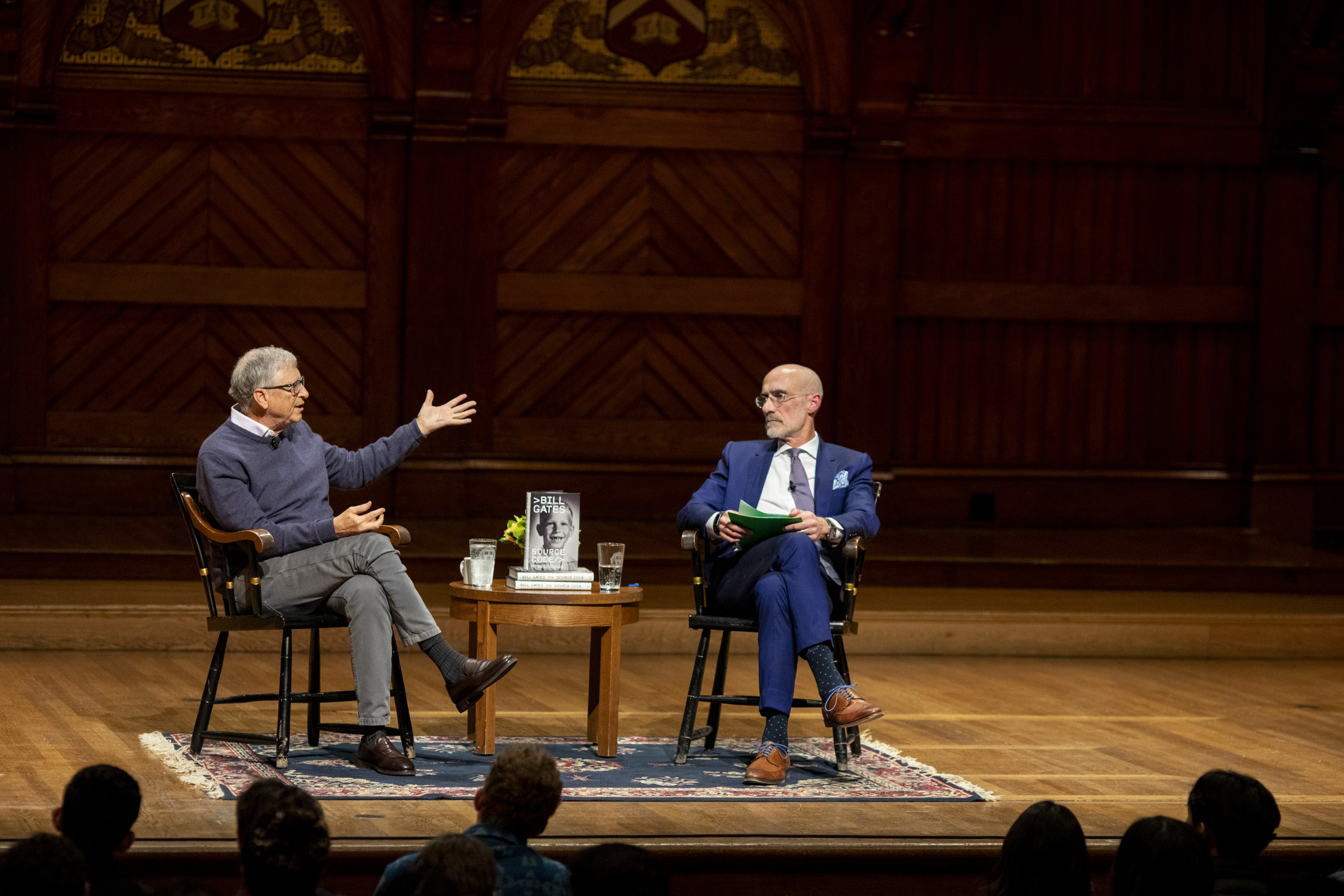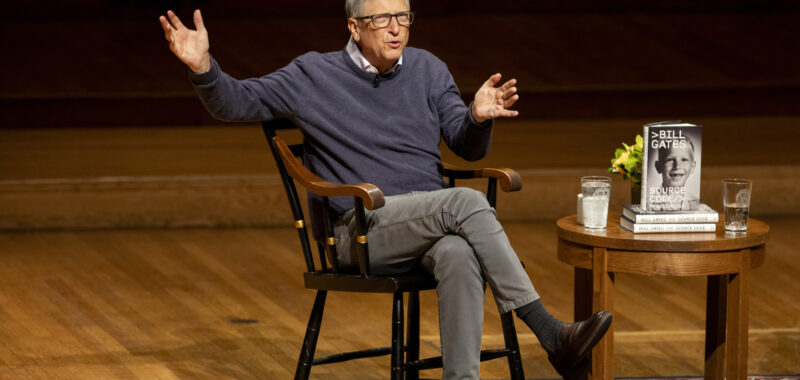Bill Gates remembers being “a tough kid.”
“Some teachers wanted to put me ahead in school; some wanted to put me behind,” said the tech pioneer, who has noted in the past that he would likely be diagnosed on the autism spectrum if growing up today. “I exercised my IQ to give my parents a hard time.”
This self-assessment was shared Monday during a campus event marking the release of “Source Code,” Gates’ fifth book and first memoir. The new work charts the billionaire philanthropist’s suburban Seattle childhood and early successes with computer programming through the infancy of Microsoft, the software giant he co-founded in 1975.
Harvard Kennedy School professor Arthur C. Brooks opened the conversation by asking what Gates hoped readers would take from the book. Gates, 69, said he hoped readers would emerge with new ideas about “curiosity and trying out new things — letting kids take risks.”
He touched on the impact of his parents, emphasizing an “intense” relationship with his achievement-oriented mother, Mary. But in the end, Gates gave them credit for allowing a precocious son to experiment in the brave new world of personal computing.
Gates stepped down as Microsoft CEO in 2000 and as chair in 2014. Today he is a high-profile supporter of global initiatives in health, agriculture, development, and education, including the annual Gates Scholarship in the U.S. for outstanding students from low-income families.
“Source Code” returns him to the simpler days of college life. Gates landed on campus in the fall of 1973, more than 10 years before Harvard offered an undergraduate degree in computer science.

By then, he had years of experience writing code for the emergent world of personal computers, unleashed by California-based Intel with the 1971 debut of its thumbnail-sized 4004 microprocessor.
But Gates initially rebuffed any suggestion of taking computer-related coursework, as he relayed during a recent visit with current Currier House residents.
“It’s too easy,” he remembered telling friends.
He writes memorably of the way he idolized pure mathematicians — “the beautiful minds on the cutting edge” — and recounts tackling the notorious Math 55A and 55B sequence in advanced calculus, where he was met with academic rigor as well as the math whizzes-turned-College buddies Andy Braiterman and Jim Sethna, both ’77.
The course proved nothing short of humbling.
“For most of my school life I had viewed math as the purest area of intellect,” he writes. “In the bigger pool of Harvard, as obvious as it sounds now, I realized that despite my innate talent, there were people better than me. And two of them were best friends.”
“In the bigger pool of Harvard, as obvious as it sounds now, I realized that despite my innate talent, there were people better than me. And two of them were best friends.”
Despite a few blows to his self-confidence, Gates’ faith in the promise of microcomputing never wavered through two and a half years at Harvard. All along, he and his high-school pal, the late Microsoft co-founder Paul Allen, kept their sights on launching a company together.
“He wanted to do hardware; I wanted to do software,” Gates recalled Monday.
A turning point came during Gates’ sophomore year. Allen was working in Boston as a low-level programmer at Honeywell by then. One snowy afternoon, just before holiday break, Allen burst into the room Gates shared with Braiterman at Currier House. Allen had run straight to the Quad from the now-closed Out of Town News kiosk near the Harvard Square T stop.
In Allen’s hands was the January 1975 issue of Popular Electronics, with a giant photo of the Altair 8800 on its cover.
“He had bought this magazine with the very first personal computer on its cover,” Gates recalled. “It was a cold Boston winter, and he said, ‘Here we are freezing to death, and the revolution has happened without us.’”
Gates would drop out of Harvard that year to start Microsoft, and five years later the company would sign a contract with IBM to write the operating system for its first PC. The firm would go on to develop popular applications, including Word, Excel, and PowerPoint.
A sea of hands waved in the air as students vied to pose questions. A recurring theme involved concerns over the current state of technology, with Gates ringing a note of nostalgia for the techno-optimism of an earlier era.
“When we did things like Microsoft Word, nobody said, ‘Oh, no! People are going to use it to write kidnap notices or incorrect documents,’” he said. “They understood it was a productivity tool that would, by and large, be a very good thing.”
“Do you have concerns about the extent to which technology has utterly taken over the lives of young people?” Brooks asked the father of three.
Anything can be taken to excess, Gates answered, noting that bookish kids were once said to linger in libraries too long. He went on to volunteer that only his youngest daughter came of age during the social networking era, and she wasn’t allowed a smartphone until age 15.
“People always thought that’s weird — the guy who helped birth some of this stuff was trying to keep his daughter from becoming an over-user,” he said.
Late in the event a student stood to solicit Gates’ thoughts on the hot-button topic of where artificial intelligence is headed.
Gates predicted, with signature buoyancy, that the “free intelligence” of AI would soon ease shortages in medicine, teaching, and more. But he conceded the technology was “a little bit scary,” given the speed of its progress.
Source link

